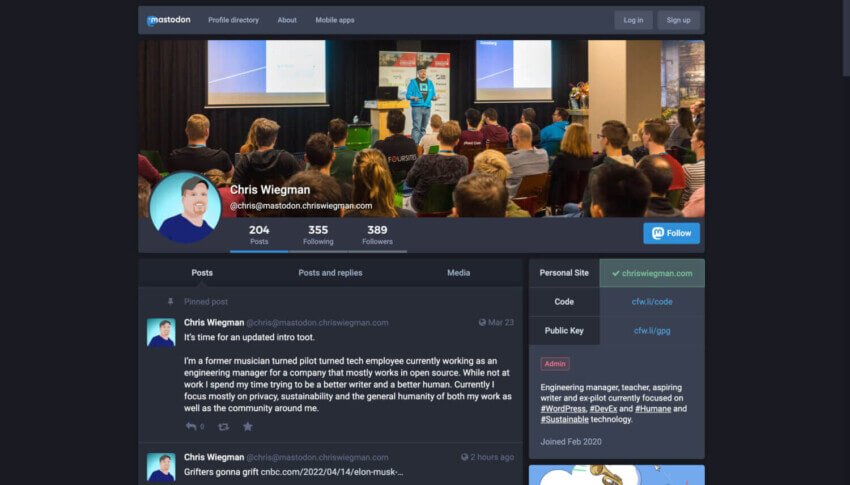
Twitter has been problematic for a very long time. Some of us have gotten lucky enough to avoid abuse and other problems but, for all too many people, it really is a toxic space full of abuse and harassment. While Elon Musk’s claim to try to buy Twitter looks like yet another of his grifts, the fact is there are many people like musk who consider this abuse and hatred a feature and would love to grow the problem under the illusion of “free speech.”
You don’t have to put up with it.
If you believe in open source software like WordPress, Linux or so much else there’s a viable alternative to Twitter as well.
Mastodon has been around for about 5 years (according to its GitHub history) and offers a privacy-respecting alternative, free of curated algorithms and even, depending on your instance, the toxicity of hatred and other trolling so endemic to the Twitter platform.
How does it do this? It does it by allowing users to host their own instance in a similar fashion as hosting your own WordPress site. These instances, which can still be allowed to talk to each other through what is called “federation” using the ActivityPub protocol, make it easy to form communities and be part of the wider Fediverse with features similar to what is offered by Twitter.
How is Mastodon like Twitter?
Mastodon allows users to post short messages called “Toots” which can be “boosted” (as opposed to retweeted), favorited and replied to in a very similar fashion as Twitter. The clients aren’t always as polished as Twitter but the ability to meaningfully engage with your community and beyond it is absolutely there as is a huge community of people who enjoy a space away from mainstream social media.
How is Mastodon different than Twitter?
While using Mastodon will feel instantly familiar to any Twitter user there are some major differences to be aware of.
First, Mastodon, unlike Twitter, is not a central service. As I described above you need to either run your own instance or join one that someone else already runs. The instance you join can have its own rules, vibe and community and can then choose which other instances it can communicate or “federate” with. This is how Mastodon can be much safer than Twitter.
Not all communities using Mastodon are benign. Hate sites such as Gab famously adopted Mastodon to create their own communities for users who were too toxic even for Twitter. The magic is that you don’t have to federate with them. A well-run Mastodon instance can choose to block entire other instances thereby protecting its users from the type of toxicity that is so endemic to centralized networks. If the instance operators see a problem they can block the entire instance, not just individual accounts. The potential of this feature to boost the safety of its users cannot be understated.
The other difference of Mastodon is you can follow more than just Mastodon accounts on your instance or others. In fact, there’s a relatively large selection of software that makes use of ActivityPub ranging from similar software to Twitter to Pixelfed, an open source alternative to Instagram, and more. The possibilities for rich, diverse content are really incredible.
The downside to Mastodon is that finding other accounts to follow can be difficult. If your instance doesn’t know about another instance a search won’t pull up its content. This means that it can be a bit more work to find all the best people to follow. On Twitter you might find hundreds of great accounts on your first day. With Mastodon it could take months to find the same accounts just by the nature of the decentralized network you’re operating in.
Getting started with Mastodon
If you’re on the fence about Mastodon my advice is to give it a try. Pick an instance from Mastodon’s community page and set up your first account. Don’t worry about picking wrong, not only can you just sign up for a different instance later but Mastodon also has great tools to help you migrate your users to your new home.
If you’re in tech and are looking for a great place to start I recommend Fosstodon. It’s a lively open-source instance with some great people.
If you want to go all in and own your own data you can download and install Mastodon yourself or use a managed host to do it for you. I’ve been using Masto.host for my own instance for the past two years without a single issue. This can allow you the ultimate control by setting up a single-user instance where you have the final say about everything (though at the expense of making it just that much more difficult to find folks to follow).
Wherever you sign up, make sure you follow me and say Hello! You can find me at https://mastodon.chriswiegman.com/@chris or by searching for me directly from your new account at chris@mastodon.chriswiegman.com.
Take back your social media experience without tracking, algorithms or trolls. It’s worth it.